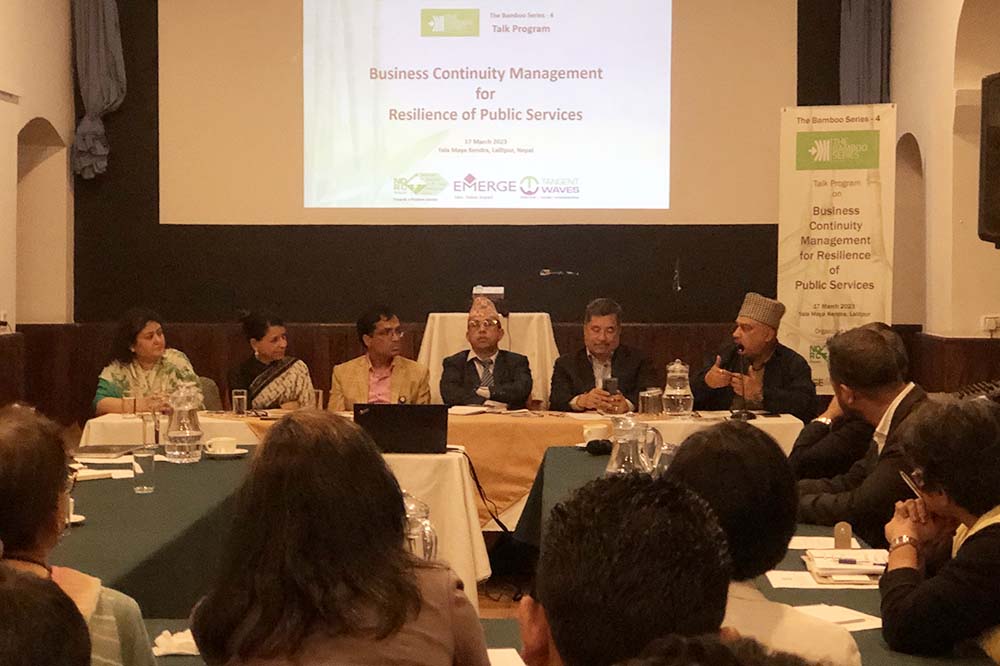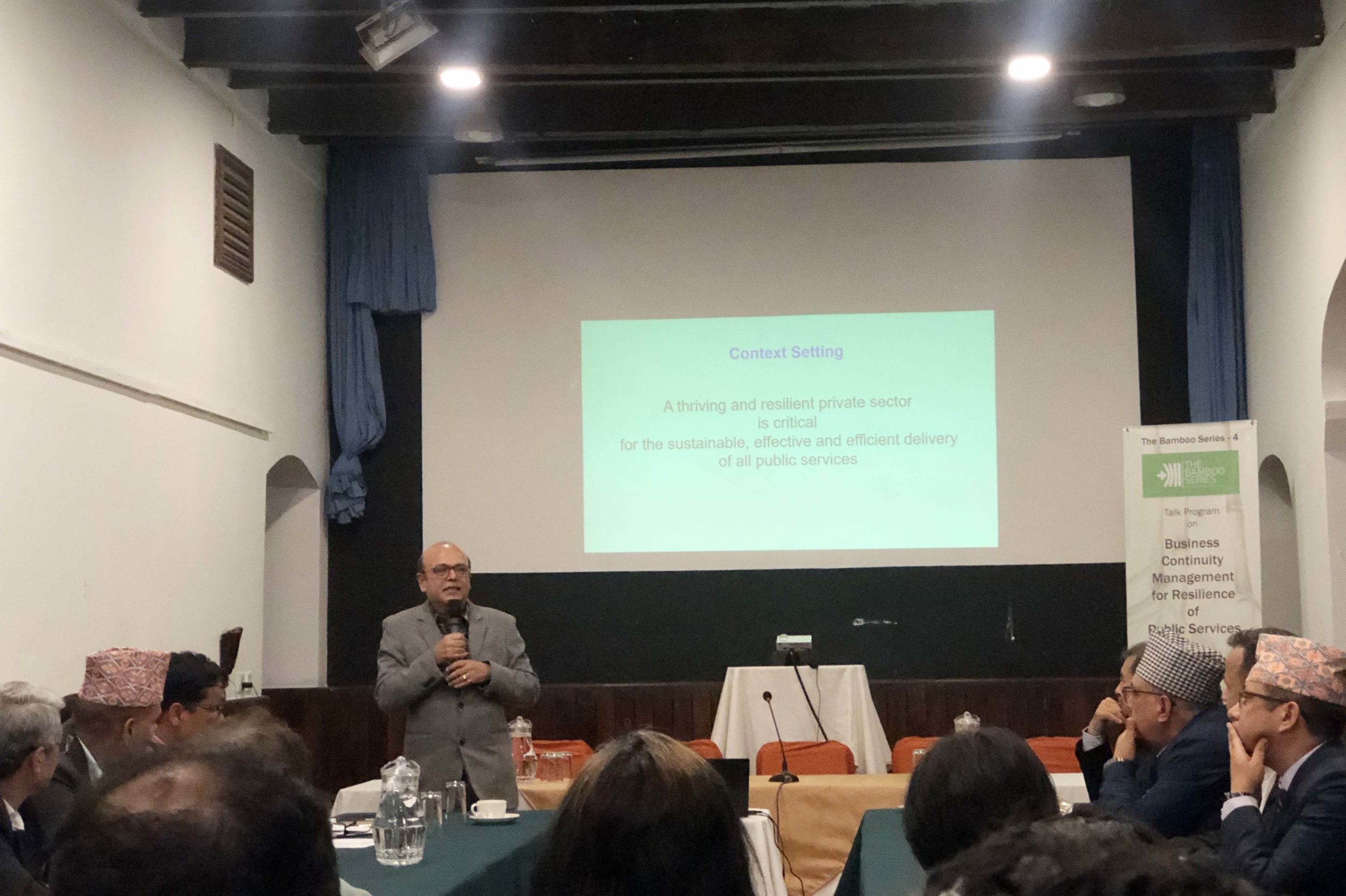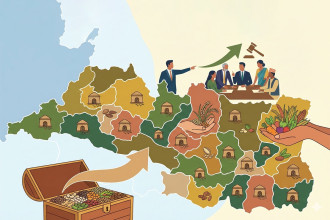
KATHMANDU: The NET consortium on March 17 organised the fourth event of 'The Bamboo Series' to discuss the topic 'Business Continuity Management for Resilience of Public Services'.
The NET consortium comprises National Disaster Risk Reduction Centre (NDRC) Nepal, Enterprise for Management, Economic Reform and Gender Equality (EMERGE), and Tangent Waves.
The event, possibly the first of its kind, provided great insights into the topic where panellists and participants brainstormed and identified ways that could facilitate the public sector to work in tandem with the private and development sector, keeping in mind that they are all interdependent.
The panellists included Bhakta Raj Joshi, Under Secretary, Ministry of Industry, Commerce and Supplies (MOICS); Tulsi Dahal, Under Secretary of the Ministry of Home Affairs and Head of Disaster Studies from the State; Kush Kumar Joshi, President of National Business Initiative Nepal (NBI); and Neeru Rayamajhi Khatri, President of the Federation of Woman Entrepreneurs' Associations of Nepal (FWEAN) from the private sector; Sristi Joshi Malla, Regional Coordinator of HomeNet South Asia; and Surya Bahadur Thapa, Chairperson of Disaster Preparedness Network-Nepal (DPNet-Nepal).
Along with Fanny Skog and Olivia Setkic from The Swedish Civil Contingencies Agency (MSB), Sweden, the event included participants from the private sector, humanitarian and development agencies, and government officials. The participants could relate to the topic discussed as it was more of an experience-sharing opportunity for those working in disaster risk reduction and management (DRRM), business, and gender equality and social inclusion (GESI).
Representing the government, MOICS Under Secretary Joshi, noted the importance of making a cohesive plan and making Business Continuity Management (BCM) a part of their budget.
Home Ministry Under Secretary Dahal also spoke of the huge socio-economic impact on businesses post-Covid. He emphasized the psychosocial effects of dealing with the pandemic and how that affected businesses, especially with people suffering from Post-Traumatic Stress Disorder (PTSD). He highlighted the importance of collaborating to restore livelihoods and creating a resource map to make businesses resilient.
Reiterating how both the earthquake and the pandemic caused a tremendous economic loss, Kush Kumar Joshi, recommended that we should be ready for all types of disasters and Business Continuity Plan (BCP) is a critical factor for businesses.
FWEAN President Khatri mentioned the challenges faced by women entrepreneurs during the pandemic. The USAID-funded project titled 'Fostering Resilience of Women-Led Businesses (including home-based women producers) and Consumers' was tremendously helpful for women entrepreneurs to brave the pandemic. She thanked USAID/Tayar Nepal, Thulo.com, and EMERGE for their unwavering support and said that FWEAN aims to provide BCP training to every female entrepreneur so that they can be better prepared to mitigate disaster impacts on their businesses.
Malla, Regional Coordinator of HomeNet South Asia, added that the home-based workers were hard hit during the pandemic as they were unaware of BCM and had limited access to communication networks. She too thanked USAID/Tayar Nepal and EMERGE in particular for providing a holistic training package for women businesses during the pandemic generating a ray of hope, motivating and upskilling them to become resilient. She stressed that a pilot programme of BCM held in Nepal could set the way forward for the rest of South Asia and showed interest to partner with the NET consortium.
 DPNet-Nepal Chairperson Thapa emphasized the importance of networking and advocating for inclusive policies to ensure the resilience of businesses. He suggested that both public and private sectors should work hand in hand and added those working on DRRM must consider including the private sector.
To walk the talk, participants showed keen interest in collaborating with the NET consortium in the future. The event was a great success as the organisers echoed the context in which the event was organised, that – ‘A thriving and resilient private sector is critical for the sustainable, effective and efficient delivery of all public services.’
The Bamboo Series is a segment of the NET Consortium’s change initiative that focuses on promoting sustainable and resilient business practices that incorporate GESI and DRRM perspectives replacing the business as usual. The change initiative was born out of the International Training Programme for Disaster Risk Management, organised by the MSB, Sweden, and is led by change agents — Shyam Jnavaly, Mona Shrestha Adhikari, and Suman Shakya, who represent the NET consortium.
READ ALSO:
DPNet-Nepal Chairperson Thapa emphasized the importance of networking and advocating for inclusive policies to ensure the resilience of businesses. He suggested that both public and private sectors should work hand in hand and added those working on DRRM must consider including the private sector.
To walk the talk, participants showed keen interest in collaborating with the NET consortium in the future. The event was a great success as the organisers echoed the context in which the event was organised, that – ‘A thriving and resilient private sector is critical for the sustainable, effective and efficient delivery of all public services.’
The Bamboo Series is a segment of the NET Consortium’s change initiative that focuses on promoting sustainable and resilient business practices that incorporate GESI and DRRM perspectives replacing the business as usual. The change initiative was born out of the International Training Programme for Disaster Risk Management, organised by the MSB, Sweden, and is led by change agents — Shyam Jnavaly, Mona Shrestha Adhikari, and Suman Shakya, who represent the NET consortium.
READ ALSO:
 DPNet-Nepal Chairperson Thapa emphasized the importance of networking and advocating for inclusive policies to ensure the resilience of businesses. He suggested that both public and private sectors should work hand in hand and added those working on DRRM must consider including the private sector.
To walk the talk, participants showed keen interest in collaborating with the NET consortium in the future. The event was a great success as the organisers echoed the context in which the event was organised, that – ‘A thriving and resilient private sector is critical for the sustainable, effective and efficient delivery of all public services.’
The Bamboo Series is a segment of the NET Consortium’s change initiative that focuses on promoting sustainable and resilient business practices that incorporate GESI and DRRM perspectives replacing the business as usual. The change initiative was born out of the International Training Programme for Disaster Risk Management, organised by the MSB, Sweden, and is led by change agents — Shyam Jnavaly, Mona Shrestha Adhikari, and Suman Shakya, who represent the NET consortium.
READ ALSO:
DPNet-Nepal Chairperson Thapa emphasized the importance of networking and advocating for inclusive policies to ensure the resilience of businesses. He suggested that both public and private sectors should work hand in hand and added those working on DRRM must consider including the private sector.
To walk the talk, participants showed keen interest in collaborating with the NET consortium in the future. The event was a great success as the organisers echoed the context in which the event was organised, that – ‘A thriving and resilient private sector is critical for the sustainable, effective and efficient delivery of all public services.’
The Bamboo Series is a segment of the NET Consortium’s change initiative that focuses on promoting sustainable and resilient business practices that incorporate GESI and DRRM perspectives replacing the business as usual. The change initiative was born out of the International Training Programme for Disaster Risk Management, organised by the MSB, Sweden, and is led by change agents — Shyam Jnavaly, Mona Shrestha Adhikari, and Suman Shakya, who represent the NET consortium.
READ ALSO:
Published Date: March 24, 2023, 12:00 am
Post Comment
E-Magazine
RELATED B360 National





